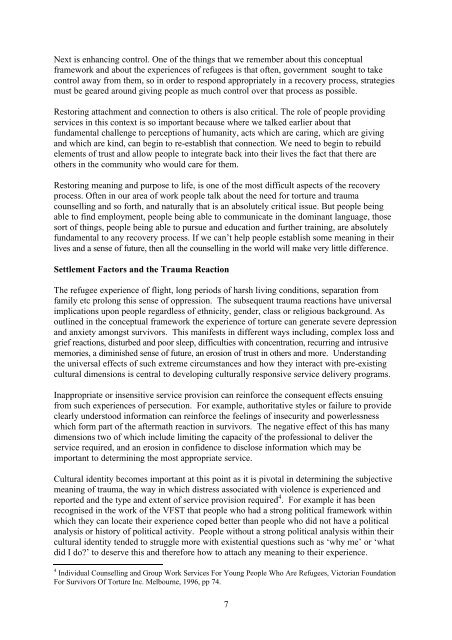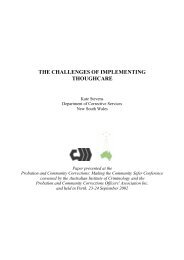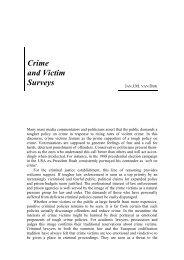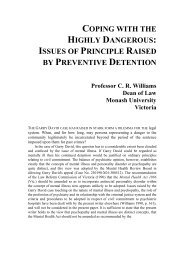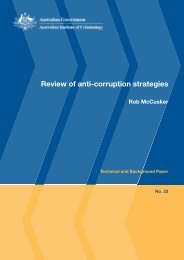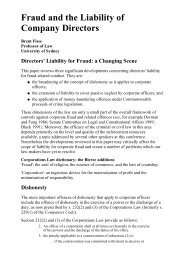Developing cultural responsiveness in the delivery of services to ...
Developing cultural responsiveness in the delivery of services to ...
Developing cultural responsiveness in the delivery of services to ...
Create successful ePaper yourself
Turn your PDF publications into a flip-book with our unique Google optimized e-Paper software.
Next is enhanc<strong>in</strong>g control. One <strong>of</strong> <strong>the</strong> th<strong>in</strong>gs that we remember about this conceptual<br />
framework and about <strong>the</strong> experiences <strong>of</strong> refugees is that <strong>of</strong>ten, government sought <strong>to</strong> take<br />
control away from <strong>the</strong>m, so <strong>in</strong> order <strong>to</strong> respond appropriately <strong>in</strong> a recovery process, strategies<br />
must be geared around giv<strong>in</strong>g people as much control over that process as possible.<br />
Res<strong>to</strong>r<strong>in</strong>g attachment and connection <strong>to</strong> o<strong>the</strong>rs is also critical. The role <strong>of</strong> people provid<strong>in</strong>g<br />
<strong>services</strong> <strong>in</strong> this context is so important because where we talked earlier about that<br />
fundamental challenge <strong>to</strong> perceptions <strong>of</strong> humanity, acts which are car<strong>in</strong>g, which are giv<strong>in</strong>g<br />
and which are k<strong>in</strong>d, can beg<strong>in</strong> <strong>to</strong> re-establish that connection. We need <strong>to</strong> beg<strong>in</strong> <strong>to</strong> rebuild<br />
elements <strong>of</strong> trust and allow people <strong>to</strong> <strong>in</strong>tegrate back <strong>in</strong><strong>to</strong> <strong>the</strong>ir lives <strong>the</strong> fact that <strong>the</strong>re are<br />
o<strong>the</strong>rs <strong>in</strong> <strong>the</strong> community who would care for <strong>the</strong>m.<br />
Res<strong>to</strong>r<strong>in</strong>g mean<strong>in</strong>g and purpose <strong>to</strong> life, is one <strong>of</strong> <strong>the</strong> most difficult aspects <strong>of</strong> <strong>the</strong> recovery<br />
process. Often <strong>in</strong> our area <strong>of</strong> work people talk about <strong>the</strong> need for <strong>to</strong>rture and trauma<br />
counsell<strong>in</strong>g and so forth, and naturally that is an absolutely critical issue. But people be<strong>in</strong>g<br />
able <strong>to</strong> f<strong>in</strong>d employment, people be<strong>in</strong>g able <strong>to</strong> communicate <strong>in</strong> <strong>the</strong> dom<strong>in</strong>ant language, those<br />
sort <strong>of</strong> th<strong>in</strong>gs, people be<strong>in</strong>g able <strong>to</strong> pursue and education and fur<strong>the</strong>r tra<strong>in</strong><strong>in</strong>g, are absolutely<br />
fundamental <strong>to</strong> any recovery process. If we can’t help people establish some mean<strong>in</strong>g <strong>in</strong> <strong>the</strong>ir<br />
lives and a sense <strong>of</strong> future, <strong>the</strong>n all <strong>the</strong> counsell<strong>in</strong>g <strong>in</strong> <strong>the</strong> world will make very little difference.<br />
Settlement Fac<strong>to</strong>rs and <strong>the</strong> Trauma Reaction<br />
The refugee experience <strong>of</strong> flight, long periods <strong>of</strong> harsh liv<strong>in</strong>g conditions, separation from<br />
family etc prolong this sense <strong>of</strong> oppression. The subsequent trauma reactions have universal<br />
implications upon people regardless <strong>of</strong> ethnicity, gender, class or religious background. As<br />
outl<strong>in</strong>ed <strong>in</strong> <strong>the</strong> conceptual framework <strong>the</strong> experience <strong>of</strong> <strong>to</strong>rture can generate severe depression<br />
and anxiety amongst survivors. This manifests <strong>in</strong> different ways <strong>in</strong>clud<strong>in</strong>g, complex loss and<br />
grief reactions, disturbed and poor sleep, difficulties with concentration, recurr<strong>in</strong>g and <strong>in</strong>trusive<br />
memories, a dim<strong>in</strong>ished sense <strong>of</strong> future, an erosion <strong>of</strong> trust <strong>in</strong> o<strong>the</strong>rs and more. Understand<strong>in</strong>g<br />
<strong>the</strong> universal effects <strong>of</strong> such extreme circumstances and how <strong>the</strong>y <strong>in</strong>teract with pre-exist<strong>in</strong>g<br />
<strong>cultural</strong> dimensions is central <strong>to</strong> develop<strong>in</strong>g <strong>cultural</strong>ly responsive service <strong>delivery</strong> programs.<br />
Inappropriate or <strong>in</strong>sensitive service provision can re<strong>in</strong>force <strong>the</strong> consequent effects ensu<strong>in</strong>g<br />
from such experiences <strong>of</strong> persecution. For example, authoritative styles or failure <strong>to</strong> provide<br />
clearly unders<strong>to</strong>od <strong>in</strong>formation can re<strong>in</strong>force <strong>the</strong> feel<strong>in</strong>gs <strong>of</strong> <strong>in</strong>security and powerlessness<br />
which form part <strong>of</strong> <strong>the</strong> aftermath reaction <strong>in</strong> survivors. The negative effect <strong>of</strong> this has many<br />
dimensions two <strong>of</strong> which <strong>in</strong>clude limit<strong>in</strong>g <strong>the</strong> capacity <strong>of</strong> <strong>the</strong> pr<strong>of</strong>essional <strong>to</strong> deliver <strong>the</strong><br />
service required, and an erosion <strong>in</strong> confidence <strong>to</strong> disclose <strong>in</strong>formation which may be<br />
important <strong>to</strong> determ<strong>in</strong><strong>in</strong>g <strong>the</strong> most appropriate service.<br />
Cultural identity becomes important at this po<strong>in</strong>t as it is pivotal <strong>in</strong> determ<strong>in</strong><strong>in</strong>g <strong>the</strong> subjective<br />
mean<strong>in</strong>g <strong>of</strong> trauma, <strong>the</strong> way <strong>in</strong> which distress associated with violence is experienced and<br />
reported and <strong>the</strong> type and extent <strong>of</strong> service provision required 4 . For example it has been<br />
recognised <strong>in</strong> <strong>the</strong> work <strong>of</strong> <strong>the</strong> VFST that people who had a strong political framework with<strong>in</strong><br />
which <strong>the</strong>y can locate <strong>the</strong>ir experience coped better than people who did not have a political<br />
analysis or his<strong>to</strong>ry <strong>of</strong> political activity. People without a strong political analysis with<strong>in</strong> <strong>the</strong>ir<br />
<strong>cultural</strong> identity tended <strong>to</strong> struggle more with existential questions such as ‘why me’ or ‘what<br />
did I do?’ <strong>to</strong> deserve this and <strong>the</strong>refore how <strong>to</strong> attach any mean<strong>in</strong>g <strong>to</strong> <strong>the</strong>ir experience.<br />
4 Individual Counsell<strong>in</strong>g and Group Work Services For Young People Who Are Refugees, Vic<strong>to</strong>rian Foundation<br />
For Survivors Of Torture Inc. Melbourne, 1996, pp 74.<br />
7


